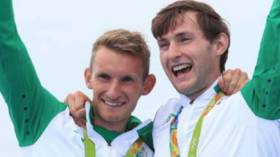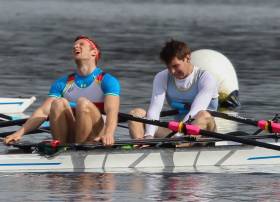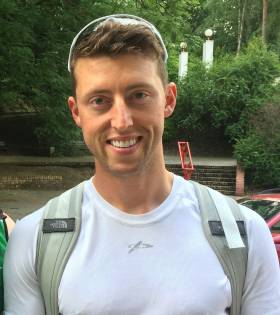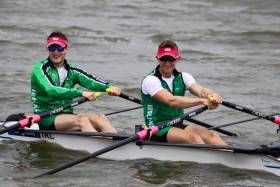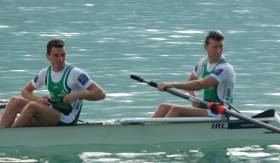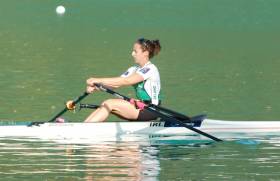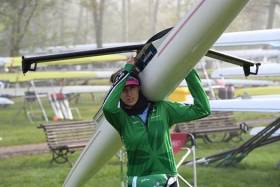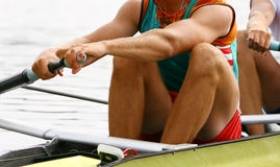Displaying items by tag: World Cup
O'Donovans Back in Action at World Cup Regatta
#Rowing: The 2017 World Rowing Cup series starts in Belgrade, Serbia tomorrow (Friday), running until Sunday. The regatta has attracted rowers from 26 nations and ranking among the medal prospects are athletes who won medals at the Rio 2016 Olympic Games. Ireland’s O’Donovan brothers, Paul and Gary, are back together for 2017 following their Olympic silver medal performance in the lightweight men’s double sculls, with their most notable competition being two of Great Britain’s most experienced lightweight rowers – Peter Chambers and Will Fletcher.
Shane O’ Driscoll and Mark O’Donovan will race in the men’s pair, in both the lightweight and heavyweight categories. Two-time Olympian Sanita Puspure will once again compete in the women’s single sculls, while Denise Walsh will feature in the lightweight equivalent. Puspure will come up against frequent opponent and fellow Rio Olympian, Belarussian Ekaterina Karsten. Puspure lost out to Karsten in the quarter-finals in Rio and went on to finish five positions back from her, in 13th place.
This is the first of three World Cup events in 2017. The season opener is generally an opportunity for teams to experiment with athletes and crews and see which combinations may work for the season ahead. In this post-Olympic year, it will be particularly interesting to see what the opposition holds due to retirees, new athletes/combinations and new talent emerging.
Friday’s start times are as follows (Irish times/all heats):
Lightweight Women’s Single Scull
09:05 – Denise Walsh (Skibbereen RC)
Men’s Pair
09:30 – Mark O’ Donovan (Skibbereen RC)/Shane O’ Driscoll (Skibbereen RC)
Women’s Single Scull
10:20 – Sanita Puspure
Lightweight Men’s Double Sculls
10:50 – Gary O’ Donovan (Skibbereen RC)/Paul O’ Donovan (UCD BC)
Jegou Ranked in Top Twenty Canoeists after World Cup Final
#Canoeing: Liam Jegou finished 14th at the canoe slalom World Cup Final in Tacen in Slovenia. The 20-year-old was less than a second from qualification from the semi-final. The course underwent major changes after building work failed: the number of gates was limited to 14. Jegou emerged with a season ranking in the World Cup events of 17th of the 103 competitors. He is in his first season on the circuit as a senior paddler.
Canoe Slalom World Cup Final, Tacen Slovenia (Irish interest)
Men
C1 Semi-Final: 14th - L Jegou 110.9 seconds.
Lynch and Lambe Edged Out of Medals in Record-Breaking Race
#Rowing: Claire Lambe and Sinead Lynch had to settle for fourth in a terrific lightweight double sculls World Cup Final in Poznan. The Netherlands had an excellent start, but Denmark set the pace through the middle stages, with Ireland and world champions New Zealand well in touch. The Kiwis pushed right up by the final 300 metres, and it became a three-boat race, with Ireland just behind. The Netherlands won in a new world best time, with Denmark and New Zealand taking silver and bronze.
World Cup Regatta, Poznan (Irish interest; selected results)
Men
Lightweight Double Sculls - A Final: 1 France (P Houin, J Azou) 6:11.92, 2 Norway (K Brun, A Strandli) 6:14.01, 3 Italy (A Micheletti, M Miani) 6:14.67; 4 Ireland (G O'Donovan, P O'Donovan) 6:15.46, 5 Britain (W Fletcher, R Chambers) 6:20.71, 6 Austria 6:26.06.
Women
Lightweight Double Sculs - A Final: 1 Netherlands (I Paul, M Head) 6:47.69 (World Best Time), 2 Denmark (AL Thomsen, J Rasmussen) 6:49.10, 3 New Zealand (S MacKenzie, J Edward) 6:50.65; 4 Ireland (C Lambe, S Lynch) 6:55.22, 5 Poland 6:55.85, 6 Italy 6:56.92.
Fourth Place for O'Donovans at World Cup in Poznan
#Rowing: Ireland finished fourth in the A Final of the lightweight double sculls at the World Cup in Poznan in Poland this morning. Ireland were given a yellow card for a false start, but it was a marginal thing. When the race proper began, Britain and France battled it out for the lead through the first 1,000 metres, with Norway and France closest to them and Ireland in fifth. France moved clear in the second half, and Ireland pushed into contention for a medal, but while Britain faded, Norway and Italy took the silver and bronze.
World Cup Regatta, Poznan (Irish interest; selected results)
Men
Lightweight Double Sculls - A Final: 1 France (P Houin, J Azou) 6:11.92, 2 Norway (K Brun, A Strandli) 6:14.01, 3 Italy (A Micheletti, M Miani) 6:14.67; 4 Ireland (G O'Donovan, P O'Donovan) 6:15.46, 5 Britain (W Fletcher, R Chambers) 6:20.71, 6 Austria 6:26.06.
Women
Lightweight Double Sculs - A Final: 1 Netherlands (I Paul, M Head) 6:47.69 (World Best Time), 2 Denmark (AL Thomsen, J Rasmussen) 6:49.10, 3 New Zealand (S MacKenzie, J Edward) 6:50.65; 4 Ireland (C Lambe, S Lynch) 6:55.22, 5 Poland 6:55.85, 6 Italy 6:56.92.
Fifth in A Final for O'Driscoll and O'Donovan
#Rowing: Ireland's Shane O'Driscoll and Mark O'Donovan finished fifth in the A Final of the lightweight double sculls at the World Cup regatta in Poznan, Poland this afternoon. The Irish crew put in a good final third, but they had slipped too far back to find a medal placing. At the head of the field, Britain's Sam Scrimgeour and Joel Cassells came under real pressure from Denmark, but held out, with France taking the bronze medal.
World Cup Regatta, Poznan, Poland (Irish interest; selected results)
Men
Lightweight Pair - Repechage (First Four to A Final; rest to B Final): 1 Ireland (M O'Donovan, S O'Driscoll) 6:36.95, 2 Denmark 6:39.04, 3 Germany 6:42.79, 4 Turkey 6:44.77; 5 Netherlands 6:49.26, 6 Austria 7:05.32. A Final: 1 Britain 6:26.78, 2 Denmark 6:27.66, 3 France 6:29.79; 4 Turkey 6:30.84, 5 Ireland 6:32.14, 6 Germany 6:35.45.
Lightweight Double Sculls - Repechage (First Two to A Final; Rest to B Final): 1 Ireland (G O'Donovan, P O'Donovan) 6:15.08, 2 Britain (W Fletcher, R Chambers) 6:15.22; 3 Germany 6:15.91, 4 Switzerland 6:36.24, 5 Romania.
Women
Lightweight Single Sculls - D Final (Places 19, 20): 1 Ireland (D Walsh) 8:04.66, 2 Thailand (R Raklao) 8:25.85.
O'Donovan Brothers Take Charge and Secure Place in Final
#Rowing: Paul and Gary O'Donovan produced a storming final 1,000 metres to win their repechage and take a place in the A Final of the lightweight double sculls at the World Cup regatta in Poznan in Poland today. Germany led all the way to halfway, looking impressive and holding off Britain and Ireland. But the O'Donovan brothers, in the middle of these two crews, charged through both and were clear leaders by the final 100 metres. Germany lost out on the crucial second place by .69 of a second.
World Cup Regatta, Poznan, Poland (Irish interest; selected results)
Men
Lightweight Pair - Repechage (First Four to A Final; rest to B Final): 1 Ireland (M O'Donovan, S O'Driscoll) 6:36.95, 2 Denmark 6:39.04, 3 Germany 6:42.79, 4 Turkey 6:44.77; 5 Netherlands 6:49.26, 6 Austria 7:05.32.
Lightweight Double Sculls - Repechage (First Two to A Final; Rest to B Final): 1 Ireland (G O'Donovan, P O'Donovan) 6:15.08, 2 Britain 6:15.22; 3 Germany 6:15.91, 4 Switzerland 6:36.24, 5 Romania.
Women
Lightweight Single Sculls - D Final (Places 19, 20): 1 Ireland (D Walsh) 8:04.66, 2 Thailand (R Raklao) 8:25.85.
O'Driscoll and O'Donovan Win Repechage To Take A Final Place
#Rowing: Ireland's good start to the second day of the World Cup regatta in Poznan in Poland continued as the lightweight men's pair won their repechage and took their place in the A Final. In bright, sunny, conditions with a strong tailwind, Mark O'Donovan and Shane O'Driscoll were in control of this race from half way and won with a clearwater lead. Denmark, Germany and Turkey took the other A Final places. The Netherlands and Austria were off the pace all through and will compete in the B Final.
World Cup Regatta, Poznan, Poland (Irish interest; selected results)
Men
Lightweight Pair - Repechage (First Four to A Final; rest to B Final): 1 Ireland (M O'Donovan, S O'Driscoll) 6:36.95, 2 Denmark 6:39.04, 3 Germany 6:42.79, 4 Turkey 6:44.77; 5 Netherlands 6:49.26, 6 Austria 7:05.32
Women
Lightweight Single Sculls - D Final (Places 19, 20): 1 Ireland (D Walsh) 8:04.66, 2 Thailand (R Raklao) 8:25.85.
Walsh Takes Chance after Capsize and Finishes With Win
#Rowing: Denise Walsh recovered from her dramatic capsize on Friday at the World Cup in Poznan with a controlled performance which won her the D Final of the lightweight single sculls this morning. The Skibbereen woman had been rescued from the water in her repechage, but showed courage to climb back into the boat and complete the race. She was originally listed as not finishing, but her brave action was recognised as she was given a time and qualified for the D Final. The Skibbereen woman was untroubled by Rojjana Raklalo of Thailand, and beat her by 21 seconds.
World Cup Regatta, Poznan, Poland (Irish interest; selected results)
Women
Lightweight Single Sculls - D Final (Places 19, 20): 1 Ireland (D Walsh) 8:04.66, 2 Thailand (R Raklao) 8:25.85.
Brave Walsh Sculls Home After Being Rescued From Capsize
#Rowing: Denise Walsh capsized with 300 metres to go in her repechage of the World Cup in Poznan. The Skibbereen woman was well in contention for an A/B semi-final place, lying third going into the last quarter. But she stopped and then, not long after resuming, her boat flipped over almost competely. Rescue craft rushed to her and took minutes to take her out of the water. The Skibbereen woman was out of the race, but not out of determination: she climbed back in the boat. Though she was not listed as finishing, she sculled to the end.
World Cup Regatta, Poznan, Poland (Irish interest; selected results)
Men
Lightweight Pair - Heat Two (First to A Final; rest to Repechage): 1 Britain (J Cassells, S Scrimgeour) 6:44.66; 4 Ireland (M O'Donovan, S O'Driscoll) 6:48.29.
Lightweight Double Sculls - Heats (Winner to A Final; rest to Repechages) - Heat One: 1 France 6:19.48; 3 Britain (W Fletcher, R Chambers) 6:25.13. Heat Two: 1 Norway 6:18.90; 2 Ireland (G O'Donovan, P O'Donovan) 6:19.45, 3 Austria 6:34.23.
Women
Lightweight Double Sculls - Heats (Winner to A Final; rest to Repechages) - Heat One: 1 Netherlands 7:04.01. Heat Two: 1 Ireland (C Lambe, S Lynch) 7:05.36; 2 Poland 7:06.48, 3 Netherlands Two 7:09.28.
Lightweight Single Sculls - Heat Two (First Two to A/B Semi-Finals; rest to Repechages): 1 Denmark (A Runge Holmegaard) 7:55.99, 2 Netherlands Three (A Van Zomeren) 7:56.83; 3 Ireland (D Walsh) 8:11.09. Repechage (First Two to A/B Semi-Final; Three to Five to C Final): Walsh 11:32.83 (orginally listed as DNF)
O'Driscoll and O'Donovan Fourth in Awful Conditions
#Rowing: In extreme conditions, Ireland's Mark O'Donovan and Shane O'Driscoll finished fourth in their heat of the lightweight men's pair at the World Cup in Poznan in Poland. Britain's Sam Scrimgeour and Joel Cassells took the one A Final place on offer, while O'Donovan and O'Driscoll battled it out with Germany and Turkey behind them in a powerful tailwind and driving rain. These crews will have a repechage tomorrow - unusually, on the same day as the final.
World Cup Regatta, Poznan, Poland (Irish interest; selected results)
Men
Lightweight Pair - Heat Two (First to A Final; rest to Repechage): 1 Britain (J Cassells, S Scrimgeour) 6:44.66; 4 Ireland (M O'Donovan, S O'Driscoll) 6:48.29.
Lightweight Double Sculls - Heats (Winner to A Final; rest to Repechages) - Heat One: 1 France 6:19.48; 3 Britain (W Fletcher, R Chambers) 6:25.13.
Heat Two: 1 Norway 6:18.90; 2 Ireland (G O'Donovan, P O'Donovan) 6:19.45, 3 Austria 6:34.23.
Women
Lightweight Double Sculls - Heats (Winner to A Final; rest to Repechages) - Heat One: 1 Netherlands 7:04.01.
Heat Two: 1 Ireland (C Lambe, S Lynch) 7:05.36; 2 Poland 7:06.48, 3 Netherlands Two 7:09.28.
Lightweight Single Sculls - Heat Two (First Two to A/B Semi-Finals; rest to Repechages): 1 Denmark (A Runge Holmegaard) 7:55.99, 2 Netherlands Three (A Van Zomeren) 7:56.83;
3 Ireland (D Walsh) 8:11.09.


























